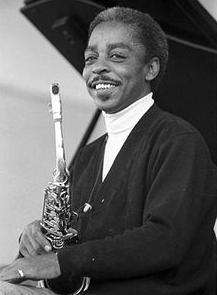Sonny Criss
William "Sonny" Criss (23 October 1927 – 19 November 1977) was an American jazz musician.[1]
Sonny Criss | |
|---|---|
 Sonny Criss | |
| Background information | |
| Birth name | William Criss |
| Born | 23 October 1927 Memphis, Tennessee, U.S. |
| Died | 19 November 1977 (aged 50) Los Angeles, California, U.S. |
| Genres | Jazz, bebop |
| Occupation(s) | Musician, composer |
| Instruments | Alto saxophone, soprano saxophone |
An alto saxophonist of prominence during the bebop era of jazz, he was one of many players influenced by Charlie Parker.
Biography
William Criss was born in Memphis, Tennessee and moved to Los Angeles at the age of 15. He then went on to play in various bands including Howard McGhee's, which also featured Charlie Parker.[1]
Criss had developed his own, concise, bluesy tone by this point, and though his basic style did not vary much, his ability on the instrument continued to develop. Nevertheless, he continued to drift from band to band, and played on some records with Johnny Otis and Billy Eckstine.[1]
His first major break came in 1947, on a number of jam sessions arranged by jazz impresario Norman Granz. In 1956 he signed to Imperial Records, based in New York, and recorded a series albums including Jazz U.S.A , Go Man! and Sonny Criss Plays Cole Porter featuring pianist Sonny Clark. Capitol, which owned the master recordings, reissued them as a 2-CD set on their Blue Note imprint in 2000. Criss also recorded At the Crossroads with pianist Wynton Kelly.
Prestige signed Criss in 1965, and he continued to record well-acclaimed albums which were mainly rooted in hard bop traditions. Sonny's Dream featured arrangements by Horace Tapscott. Later sessions were recorded for Muse and Impulse.
By 1977, Criss had developed stomach cancer and did not play again. As a consequence of this painful condition, Criss committed suicide (self-inflicted gunshot) in 1977 in his adopted city of Los Angeles.[1] He never married, but had one son, Steven Criss.
On June 25, 2019, The New York Times Magazine listed Sonny Criss among hundreds of artists whose material was reportedly destroyed in the 2008 Universal fire.[2]
Discography
As leader
- California Boppin' (Fresh Sound, 1947)
- Intermission Riff (Pablo, 1951 [1988])
- Jazz USA (Imperial, 1956)
- Go Man! (Imperial, 1956)
- Sonny Criss Plays Cole Porter (Imperial, 1956)
- Sonny Criss at the Crossroads (Peacock, 1959) on CD as Featuring Wynton Kelly
- Criss Cross (Imperial, 1963) compilation
- Mr. Blues Pour Flirter (Brunswick [France] Records, 1963)
- This Is Criss! (Prestige, 1966)
- Portrait of Sonny Criss (Prestige, 1967)
- Up, Up And Away (Prestige, 1967)
- The Beat Goes On! (Prestige, 1968)
- Sonny's Dream (Birth of the New Cool) (Prestige, 1968)
- Rockin' in Rhythm (Prestige, 1968)
- I'll Catch the Sun! (Prestige, 1969)
- The Best Of Sonny Criss: Hits of the '60's (Prestige, 1970) compilation
- Live in Italy (Fresh Sound, 1974)
- Saturday Morning (Xanadu, 1975)
- Crisscraft (Muse, 1975)
- Out of Nowhere (Muse, 1976)
- Warm & Sonny (Impulse!, 1976)
- The Joy of Sax (Impulse!, 1977)
- The Sonny Criss Memorial Album (Xanadu, 1984)
As sideman
With Dexter Gordon
With Wardell Gray All Stars
- Wardell Gray Memorial, Vol. 2 (Prestige, 1950)
With Charlie Parker and Chet Baker
- Inglewood Jam (Fresh Sound, 1952)
With Buddy Rich
- The Wailing Buddy Rich (Norgran, 1955)
- The Swinging Buddy Rich (Norgran, 1955)
- The Cinch - quintet Live at Birdland - (1958)
With Lou Rawls and Onzy Matthews Big Band
- Tobacco Road (Capitol, 1963)
With Onzy Matthews
- Sounds For The '60's (Capitol, 1966)
With Esther Phillips and Onzy Matthews Orchestra
- Confessin' The Blues (Atlantic, 1966)
With Hampton Hawes All Stars
- Live At Memory Lane (Fresh Sound, 1970)
References
- "Sonny Criss - Biography & History - AllMusic". AllMusic. Retrieved 21 November 2018.
- Rosen, Jody (June 25, 2019). "Here Are Hundreds More Artists Whose Tapes Were Destroyed in the UMG Fire". The New York Times. Retrieved June 28, 2019.